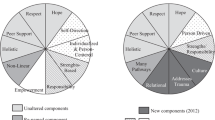Abstract
The idea of the transformative nature of mental distress and, more particularly, of the wounded healer is geographically and temporally widespread, being attributed variously to classical Greece, biblical Judaism, Siberian Shamanism, the Jungian analytical psychology tradition, Alcoholics Anonymous, and self-help movements. It is also a commonplace in modern and contemporary Christian theology and spirituality. This paper will explore the idea as it is found in the writings of Henri Nouwen, focusing on his experience of depression as an occasion for spiritual growth. It will then critically evaluate a potentially transformative view, drawing on Nouwen and other sources, and suggesting some important emphases a transformative view needs to adopt if it is to avoid philosophical and pastoral pitfalls.
Similar content being viewed by others
Notes
According to Jackson, the idea that healing of others is essential to self-healing is found, quite independently, in the context of Alcoholics Anonymous and of self-help groups. In fact, this idea is so embedded in Alcoholics Anonymous that helping others to recover is included among the Twelve Steps (Jackson 2001, pp. 28–30), and so the recovering alcoholic is not seen as rehabilitated until he or she has helped to heal someone else. The Alcoholics Anonymous movement also views the healer’s woundedness as increasing their ability to heal, though this is cashed out in terms of the increased probability that the newly recovering alcoholic will listen to the ‘healer’ since they will perceive that the ‘healer’ has ‘been through it’ themselves. Therefore, the woundedness of the healer is effective primarily because of the wounded person’s attitude towards him or her, rather than for the way in which the wound affects the healer him or herself. This distinguishes the treatment of the ‘wounded healer’ theme in the Alcoholics Anonymous Movement from its expression in the Christian and analytical psychology tradition that Nouwen inherited.
Vanier went on to articulate a similar idea of suffering as transformative in relation to Nouwen: “And through all of that, the power of God was working, and that’s where I see the mystery.” Vanier himself wrote a pamphlet on depression (Seeing Beyond Depression [SPCK, 2001]).
References
Anderson, R. (2002). Dancing with wolves, feeding the sheep: Musings of a maverick theologian. Eugene, OR: Wipf & Stock.
Boisen, A. (1960). Out of the depths: An autobiographical study of mental disorder and religious experience. New York: Harper and Brothers.
Eco, U. (1998). The name of the rose. London: Vintage, Random House.
Ford, M. (1999). Wounded prophet: A portrait of Henri J. M. Nouwen. New York: Double Day, Random House.
Hick, J. (2007). Evil and the God of love. 4th rev. ed. New York: Palgrave Macmillan.
Hillman, J. (1967). Insearch: Psychology and religion. New York: Scribner & Sons.
Jackson, S. W. (2001). The wounded healer. Bulletin of the History of Medicine, 75, 1–36.
Jung, C. G. (1995). Memories, dreams, reflections. London: Fontana Press.
Nouwen, H. (1988). The road to daybreak: A spiritual journey. Garden City, NY: Doubleday.
Nouwen, H. (2008). The wounded healer: Ministry in contemporary society. London: Darton, Longman and Todd.
Nouwen, H. (2009). The inner voice of love: A journey through anguish to freedom. London: Darton, Longman and Todd.
Scrutton, A. P. (in press). Two Christian theologies of depression. Philosophy, Psychiatry and Psychology.
Søvik, A. O. (2008). Why almost all moral critique of theodicy is misplaced. Religious Studies, 44, 479–484.
Swinton, J. (2007). Raging with compassion: Pastoral responses to the problem of evil. Cambridge, UK: William B. Eerdmans.
Acknowledgments
Particular thanks go to Ian Kidd, Theodora Hawksley, and two anonymous peer reviewers of Pastoral Psychology for helpful comments and encouragement.
Author information
Authors and Affiliations
Corresponding author
Rights and permissions
About this article
Cite this article
Scrutton, A.P. Suffering as Potentially Transformative: A Philosophical and Pastoral Consideration Drawing on Henri Nouwen’s Experience of Depression. Pastoral Psychol 64, 99–109 (2015). https://doi.org/10.1007/s11089-013-0589-6
Published:
Issue Date:
DOI: https://doi.org/10.1007/s11089-013-0589-6




